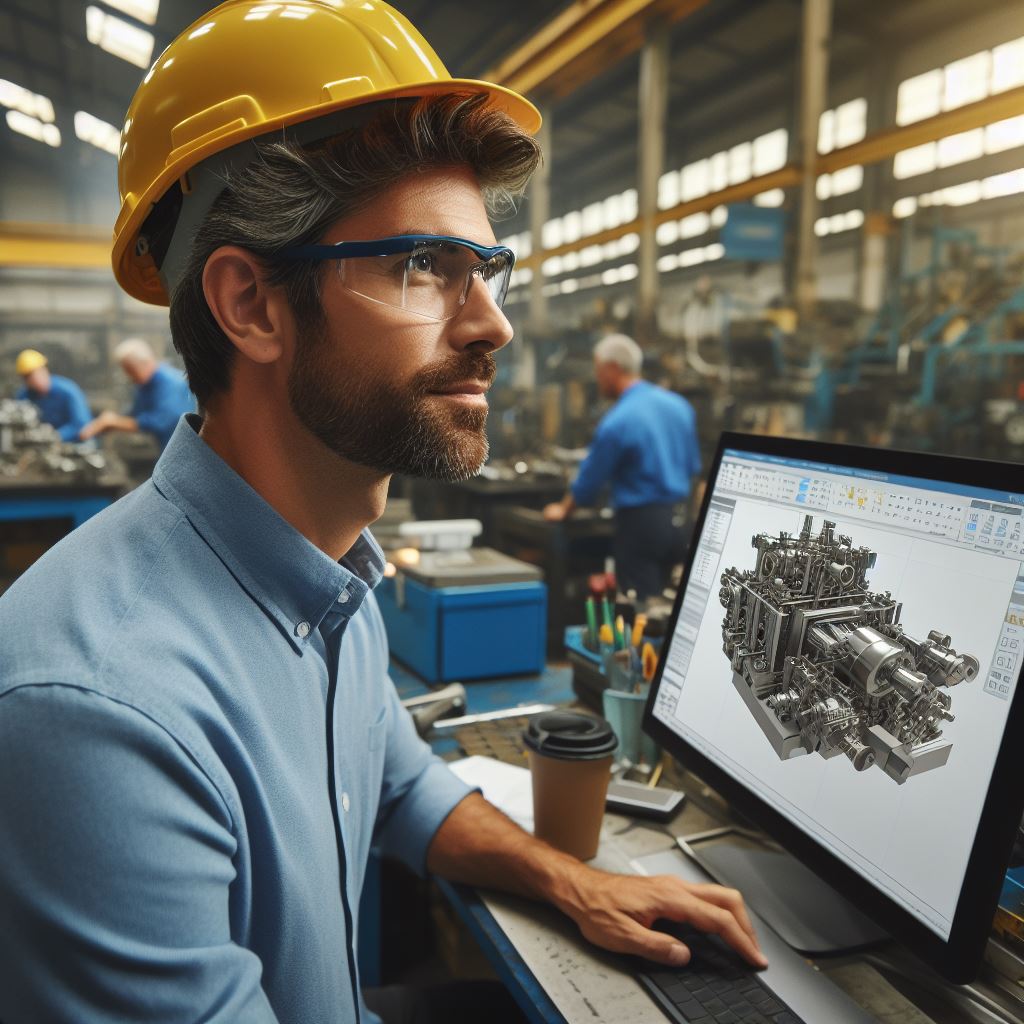Introduction
A mechanical engineer is responsible for designing, developing, and maintaining mechanical systems and machines.
It is crucial to understand the day-to-day activities of a mechanical engineer as it provides insight into their role and importance.
A. What a mechanical engineer does
Mechanical engineers apply scientific principles to design, develop, and test mechanical devices and systems.
They analyze problems, create prototypes, and oversee production and installation processes.
Mechanical engineers are essential in various industries, including automotive, aerospace, energy, and manufacturing.
B. Importance of understanding a day in the life of a mechanical engineer
Understanding a day in the life of a mechanical engineer helps appreciate their contributions to society.
It highlights the challenges they face, the skills they utilize, and the solutions they provide to complex engineering problems.
Observing their daily routine can inspire aspiring engineers and shed light on the practical applications of their work.
By understanding their responsibilities, we can better comprehend the impact mechanical engineers have on our daily lives.
In general, mechanical engineers play a vital role in designing and maintaining mechanical systems that impact numerous industries.
By understanding their day-to-day activities, we can recognize their significance and inspire future generations to pursue this rewarding career.
Education and Skills
A. Overview of the educational requirements for becoming a mechanical engineer
- Pursuing a career as a mechanical engineer requires a strong educational background.
- A bachelor’s degree in mechanical engineering or a related field is typically required.
- Courses such as calculus, physics, mechanics, and thermodynamics are fundamental in this field.
- Some universities also offer specialized programs, allowing students to focus on specific areas of mechanical engineering.
- Aspiring mechanical engineers may choose to pursue a master’s or doctoral degree for further specialization.
- Continuing education and staying updated with the latest advancements is crucial in this rapidly evolving field.
B. Importance of technical skills in the field
- Mechanical engineers need a deep understanding of various technical concepts and principles.
- Proficiency in computer-aided design (CAD) software is essential for designing and modeling mechanical systems.
- Knowledge of finite element analysis (FEA) helps engineers simulate and analyze the structural integrity of designs.
- Familiarity with programming languages allows engineers to develop software solutions for automation and control systems.
- Strong analytical skills enable engineers to solve complex problems and optimize mechanical designs.
- Being skilled in 3D printing and additive manufacturing opens up new possibilities for rapid prototype development.
C. Key soft skills required for success in the profession
- Communication skills: Mechanical engineers need to effectively communicate their ideas to colleagues and clients.
- Problem-solving ability: The profession demands engineers who can find innovative solutions to technical challenges.
- Teamwork and collaboration: Many projects require engineers to work with interdisciplinary teams.
- Time management skills: Meeting project deadlines and effectively managing workload is crucial.
- Adaptability: Mechanical engineers should be able to adjust to changing project requirements and industry trends.
- Strong work ethic: The field requires dedication, attention to detail, and a commitment to excellence.
In summary, pursuing a career as a mechanical engineer requires a solid educational foundation, including a bachelor’s degree in mechanical engineering or a related field.
Technical skills such as CAD proficiency, FEA knowledge, programming abilities, and 3D printing expertise are crucial for success in the field.
Additionally, soft skills such as communication, problem-solving, teamwork, time management, adaptability, and a strong work ethic are also essential.
Continuous learning and staying updated with the latest advancements are key to thriving in this dynamic profession.
Read: Australian EE: Industry vs. Academic Paths
Your Personalized Career Strategy
Unlock your potential with tailored career consulting. Get clear, actionable steps designed for your success. Start now!
Get StartedMorning Routine
A. Start of the workday and arrival at the workplace
The alarm blares, signaling the start of a new day for a mechanical engineer.
Every morning, a mechanical engineer embarks on a new day filled with challenges, innovation, and problem-solving.
As they start their workday and arrive at the workplace, a sense of enthusiasm and anticipation propels them forward.
With their expertise in designing, analyzing, and improving mechanical devices and systems, each day offers an exciting opportunity to contribute to the ever-evolving field of engineering.
B. Engaging in team meetings or discussions
The engineer attends morning meetings, exchanging ideas and updates with colleagues.
No morning routine for a mechanical engineer is complete without engaging in team meetings or discussions.
This is a crucial part of their day as it allows them to collaborate with their colleagues, exchanging knowledge, brainstorming ideas, and seeking solutions to complex problems.
The engineer actively participates in these interactions, providing valuable insights and contributing to the collective expertise of the team.
C. Reviewing current projects and tasks for the day
The engineer strategically oversees ongoing projects, prioritizing tasks and dedicating time for daily reviews.
Regular assessments optimize productivity, ensuring efficient time and resource management.
Engaging in morning routine activities fosters professional relationships, effective communication, and collaboration within the team.
As the day progresses, armed with insights from team meetings, the engineer tackles projects with clarity and purpose, preventing oversights and meeting deadlines.
This routine establishes a robust foundation for a successful day in the life of a mechanical engineer.
Active participation in team interactions promotes camaraderie, idea exchange, and industry best practices.
Mentally preparing for challenges, the engineer sharpens problem-solving skills, gears up for innovation, and starts each day with purpose and passion, solidifying their integral role in shaping the future of mechanical engineering.
Stand Out with a Resume That Gets Results
Your career is worth more than a generic template. Let us craft a resume and cover letter that showcase your unique strengths and help you secure that dream job.
Get HiredRead: Emerging Tech Trends in Aussie EE
Design and Development
A. Involvement in the design and development process
As a mechanical engineer, I play a crucial role in the design and development process of various products and systems. My expertise is sought after right from the initial concept stage.
With my deep understanding of engineering principles, I actively contribute to brainstorming sessions, offering valuable insights and suggestions to enhance the design and functionality of the product.
Throughout the process, I collaborate closely with other stakeholders, such as industrial designers and product managers, to ensure that the final product aligns with the desired specifications.
Moreover, I am responsible for conducting feasibility studies to assess the practicality of the design, taking into account factors like cost, materials, and manufacturing processes.
By actively participating in the design and development process, I have the opportunity to shape the final product, making it more efficient, ergonomic, and user-friendly.
B. Utilization of CAD software and other tools for modeling and prototyping
To bring our design ideas to life, I utilize Computer-Aided Design (CAD) software and other cutting-edge tools for modeling and prototyping purposes.
CAD software allows me to create accurate and detailed 3D models of the product, enabling me to visualize its geometry, structure, and functioning.
I can then simulate different operating conditions and test the design’s performance virtually, identifying potential flaws and areas of improvement, thereby saving valuable time and resources.
Once the virtual model is refined, I collaborate with the manufacturing team to create physical prototypes using advanced prototyping technologies like 3D printing.
These prototypes serve as tangible representations of the design, enabling us to conduct further testing, evaluate its practicality, and obtain feedback from stakeholders.
By utilizing CAD software and advanced prototyping tools, I can iteratively refine the design, making necessary modifications and ensuring a high level of precision before final production.
C. Collaboration with other engineers and professionals in the team
As a mechanical engineer, I work closely with a diverse team of professionals, including other engineers, designers, and technicians.
Collaboration is essential to ensure that the design and development process is seamless and efficient.
Transform Your LinkedIn for Maximum Impact
Elevate your professional brand with a LinkedIn profile that attracts recruiters, showcases your expertise, and maximizes opportunities. Stand out in your industry with a profile built for success.
Boost ProfileI communicate regularly with electrical, civil, and chemical engineers to integrate their expertise into the overall product design and ensure its smooth functioning.
Additionally, I collaborate with industrial designers to strike a balance between form and function, creating aesthetically pleasing products that meet the user’s needs.
Throughout the project, I constantly share updates and progress reports with the team, ensuring transparency and facilitating effective decision-making.
By collaborating with other engineers and professionals, I can tap into their knowledge and skills, allowing us to collectively create innovative and successful products.
When all is said and done, design and development form an integral part of a mechanical engineer’s role.
By actively participating in the process, utilizing CAD software and other tools, and collaborating with fellow engineers, I contribute to the creation of efficient and functional products that meet the needs of our users.
Read: EE Licensing in Australia: A Guide
Testing and Analysis
A. Conducting experiments and tests to evaluate performance and efficiency
As a mechanical engineer, one of my primary responsibilities is to conduct experiments and tests to assess the performance and efficiency of various mechanical systems and components.
This involves designing and implementing experiments to gather real-world data.
In these experiments, I examine how different factors such as load, stress, and temperature affect the performance of mechanical systems.
By actively manipulating these variables, I can observe their impact on the efficiency and durability of the equipment.
Additionally, I collaborate with a team of technicians and experts to ensure that the experiments are conducted accurately and safely.
Together, we set up the necessary equipment, monitor the tests in real-time, and collect data for analysis.
Once the experiments are completed, I analyze the gathered data using advanced software and statistical tools.
This data analysis allows me to identify trends, patterns, and correlations that help me draw meaningful conclusions about the performance and efficiency of the systems under test.
B. Gathering and analyzing data to make informed decisions
Beyond conducting experiments, another crucial aspect of my job as a mechanical engineer is to gather and analyze data to make informed decisions.
This involves collecting data from various sources, including experiments, simulations, and existing literature.
When gathering data, I ensure that it is relevant, accurate, and reliable. This may involve performing extensive literature reviews, consulting industry experts, or analyzing data from previous experiments.
By triangulating different sources of data, I can obtain a comprehensive understanding of the problem at hand.
Once the data is collected, I use data analysis techniques to extract meaningful insights. I apply statistical methods and visualization tools to identify trends, anomalies, and outliers in the data.
This analysis forms the basis for making informed decisions regarding the design, optimization, and improvement of mechanical systems.
C. Ensuring compliance with safety and quality standards
As a mechanical engineer, I am committed to ensuring compliance with safety and quality standards in all my work.
This includes conducting tests and analysis in accordance with relevant regulations, industry standards, and best practices.
When designing experiments, I prioritize the safety of all personnel involved, as well as the integrity of the equipment being tested.
I carefully plan and implement safety protocols to minimize any potential risks.
Additionally, I ensure that all experiments are conducted in controlled environments to maintain accurate and reliable results.
Furthermore, I apply strict quality control measures during data collection and analysis.
This involves validating data for accuracy, calibrating instruments, and maintaining proper documentation.
By adhering to these standards, I can confidently ensure that the data generated and decisions made are reliable and of high quality.
All in all, testing and analysis are integral to the role of a mechanical engineer.
By conducting experiments, gathering and analyzing data, and ensuring compliance with safety and quality standards,
I am able to evaluate performance, make informed decisions, and contribute to the field of mechanical engineering.
Read: Electrical Safety Standards in Australia

Problem-solving and Troubleshooting
A. Dealing with unexpected challenges and issues
In the life of a mechanical engineer, problem-solving and troubleshooting are an essential part of their daily routine.
No matter how well-planned a project is, unexpected challenges and issues always arise, requiring immediate attention and resolution.
Whether it’s a malfunctioning machine or a design flaw, a mechanical engineer must be prepared to face these obstacles head-on.
They must analyze the situation, identify the root cause of the problem, and come up with effective solutions.
One of the challenges mechanical engineers face is the pressure to fix these problems quickly and efficiently.
Time is often of the essence, especially in industries where downtime can result in significant financial losses.
B. Applying technical knowledge and experience to find solutions
Problem-solving in the field of mechanical engineering requires a deep understanding of technical knowledge and experience.
Mechanical engineers must apply their expertise to find innovative solutions that meet both technical requirements and project constraints.
They utilize their knowledge of physics, mathematics, and material science to analyze the problem and propose viable solutions.
Through this process, they may need to consider various factors like cost, efficiency, and environmental impact.
Innovative thinking is crucial in this stage as mechanical engineers find ways to optimize designs and improve the performance of mechanical systems.
They may have to think outside the box and consider unconventional approaches to solving complex problems.
C. Collaborating with colleagues to resolve complex problems
Problem-solving in mechanical engineering often requires collaboration and teamwork.
Complex problems often require input from multiple experts with diverse skill sets and perspectives.
A mechanical engineer must effectively communicate and collaborate with colleagues, such as electrical engineers, technicians, and designers.
Together, they pool their knowledge and expertise to brainstorm solutions and overcome obstacles.
In such collaborative environments, mechanical engineers learn from others and also contribute their own insights.
This collective problem-solving approach promotes innovation, as different ideas come together to create better solutions.
The ability to work well within a team is crucial, as it enhances problem-solving processes and increases the chances of finding a successful resolution.
In a nutshell, problem-solving and troubleshooting are integral parts of a mechanical engineer’s daily life.
They face unexpected challenges, apply technical knowledge and experience, and collaborate with colleagues to find effective solutions.
By utilizing their problem-solving skills, mechanical engineers contribute to the advancement of technology and the improvement of our daily lives.
Project Management
A. Overseeing the progress and deadlines of ongoing projects
As a mechanical engineer, one of the key responsibilities is to ensure that projects are running smoothly.
Monitoring the progress and deadlines of ongoing projects is crucial to meet client expectations and deliver results.
By actively overseeing the development of each project, potential issues can be identified and addressed promptly.
B. Allocating resources effectively to ensure project success
To ensure project success, it is essential to allocate resources effectively.
This involves managing the availability of materials, equipment, and personnel required for the project.
By carefully considering the needs of each project, resources can be optimized to achieve the desired outcome efficiently.
C. Communicating with clients or stakeholders to address concerns and provide updates
Effective communication with clients or stakeholders is vital for the success of any project.
Mechanical engineers must regularly provide updates on project progress and address any concerns or issues raised.
Clear and concise communication ensures that all parties are on the same page and can make informed decisions.
Project management plays a crucial role in the professional life of a mechanical engineer.
In this section, we will delve deeper into the responsibilities and skills required for effective project management.
Why is overseeing the progress and deadlines of ongoing projects important?
- Overseeing the progress and deadlines of ongoing projects is essential to ensure they stay on track.
- It allows mechanical engineers to identify potential bottlenecks or delays and take corrective actions.
- By closely monitoring the project’s development, they can ensure timely completion and meet client expectations.
How does allocating resources effectively contribute to project success?
- Allocating resources effectively is vital to ensure that the project has the necessary means to progress.
- By managing resources efficiently, mechanical engineers can prevent issues like material shortages or insufficient manpower.
- This ensures that the project progresses smoothly, avoiding unnecessary delays and maintaining high-quality standards.
Why is communication with clients or stakeholders important in project management?
- Effective communication with clients or stakeholders fosters transparency and trust.
- By providing regular updates on project progress, mechanical engineers keep all parties informed.
- Addressing concerns and answering questions promptly helps build strong relationships and ensures client satisfaction.
In essence, project management is a critical aspect of a mechanical engineer’s role.
Overseeing project progress, allocating resources effectively, and maintaining clear communication are essential.
Successful project management ensures timely delivery, optimal resource utilization, and client satisfaction.
Uncover the Details: Top Skills Needed for Technical Technicians
You Might Also Like: The Future of Urban Design in Australia
You Might Also Like: Top Civil Engineering Projects in Australia
Professional Development and Networking
A day in the life of a mechanical engineer is not just about work.
It also involves opportunities for professional development and networking to stay updated on industry trends, build connections, and advance in the field.
A. Attending conferences, workshops, and seminars to stay updated on industry trends
- Conferences provide a platform to learn about the latest advancements and innovations in the mechanical engineering industry.
- Attending workshops allows mechanical engineers to gain hands-on experience and practical knowledge in specific areas of interest.
- Seminars provide a focused learning environment where experts share their insights and expertise on various subjects.
- By attending these events, mechanical engineers can stay updated on emerging technologies and industry best practices.
B. Building professional connections through networking events
- Networking events enable mechanical engineers to meet professionals from various companies and industries.
- Building connections with other professionals can lead to collaborative opportunities and knowledge sharing.
- Networking events also provide a platform to learn from the experiences of others and gain valuable insights.
- Establishing a strong professional network can open doors to career growth and new job opportunities.
C. Continuous learning and skill improvement to advance in the field
- Mechanical engineers must stay updated with the latest tools, techniques, and methodologies used in the industry.
- Continuous learning can be achieved through online courses, certifications, and specialized training programs.
- By continuously enhancing their skills and knowledge, mechanical engineers can stay competitive in the job market.
- Learning new skills also enables them to take on more challenging projects and advance in their careers.
Professional development and networking are essential aspects of a mechanical engineer’s career.
By actively participating in conferences, workshops, and seminars, they can stay updated on industry trends and expand their knowledge base.
Building professional connections through networking events can open doors to collaboration and career opportunities.
Continuous learning and skill improvement are crucial for remaining competitive in the dynamic field of mechanical engineering.
By investing in their professional development, mechanical engineers can advance their careers and make significant contributions to the industry.
Uncover the Details: Freelance Drafting in Australia: Pros and Cons
Work-Life Balance and Personal Reflections
A. Importance of maintaining work-life balance in a demanding profession
- As a mechanical engineer, maintaining a work-life balance is crucial for overall well-being.
- The demanding nature of the profession can easily lead to burnout and health issues.
- Long working hours, tight deadlines, and challenging projects put immense pressure on engineers.
- However, striking a balance between work and personal life is essential for long-term success.
- When engineers prioritize their well-being, they can perform better in their professional roles.
- Having time for hobbies, family, and personal interests helps in rejuvenating the mind.
- Engaging in activities outside of work enhances creativity and problem-solving abilities.
- It allows engineers to unwind, reduce stress, and maintain a positive outlook towards their careers.
- Work-life balance also ensures sustainable productivity and prevents job dissatisfaction.
- Taking breaks, setting boundaries, and practicing self-care are vital for a healthy work-life balance.
B. Personal experiences and reflections on being a mechanical engineer
- Being a mechanical engineer has been an incredibly enriching and rewarding journey for me.
- Every day brings new challenges and opportunities to learn and grow in the field.
- I have had the privilege of working on diverse projects, from designing innovative prototypes to optimizing manufacturing processes.
- Collaborating with interdisciplinary teams has given me valuable insights into various aspects of engineering.
- The sense of accomplishment when a project comes to fruition is truly unmatched.
- However, being an engineer also comes with its fair share of pressures and setbacks.
- There have been instances where I’ve had to overcome obstacles and learn from failures.
- Nevertheless, these experiences have made me more resilient and adaptable as a professional.
- Being a mechanical engineer requires continuous learning and staying updated with the latest technologies.
- It is a limitless field with endless possibilities, making every day exciting and intellectually stimulating.
C. Advice for aspiring mechanical engineers
- Pursue your passion for mechanics and engineering wholeheartedly.
- Always strive for excellence and never stop learning.
- Develop strong problem-solving and analytical skills, they are the foundation of being a successful engineer.
- Be open to new experiences and challenges, as they will broaden your horizons.
- Build a strong professional network and seek mentors who can guide you in your career.
- Embrace failures and setbacks as learning opportunities, and use them to fuel your growth.
- Maintain a healthy work-life balance to avoid burnout and sustain long-term success.
- Stay updated with latest industry trends and technologies, as they evolve rapidly.
- Never hesitate to ask questions and seek help when needed, as it shows your eagerness to learn.
- Lastly, always believe in yourself and your capabilities, and never give up on your dreams.
In summary, being a mechanical engineer offers a unique blend of challenges and rewards.
It is crucial to maintain a healthy work-life balance to excel in this demanding profession.
Personal experiences and reflections shape an engineer’s journey, leading to continuous growth and learning.
Aspiring mechanical engineers should embrace the advice provided to navigate their careers successfully.
Discover More: Mechanical Engineering Graduates’ Guide
Conclusion
A. Recap of a day in the life of a mechanical engineer
A day in the life of a mechanical engineer is dynamic, challenging, and rewarding.
Starting with planning and organizing tasks, a mechanical engineer tackles various projects and collaborates with team members.
Using their expertise and skills, they design, analyze, and test mechanical systems and components.
Hands-on work in workshops and labs gives them the opportunity to turn their ideas into tangible prototypes.
They also collaborate with clients, suppliers, and other professionals to ensure the successful execution of projects.
Troubleshooting and problem-solving are integral parts of their routine, requiring critical thinking and innovation.
Regular learning and staying updated with advancements in technology and industry trends are essential for their growth.
B. Encouragement for readers to explore this career path
If you are intrigued by the intricacies of machines, love problem-solving, and have a passion for innovation, a career as a mechanical engineer might be perfect for you.
The field offers endless opportunities to contribute to society and make a positive impact.
From designing sustainable energy systems to creating life-saving medical devices, mechanical engineers play a crucial role in shaping the future.
C. Call to action for further reading or exploring related content
To learn more about the exciting world of mechanical engineering, I encourage you to explore related articles, books, and online resources.
Engage with professionals in this field, attend conferences and workshops, and consider pursuing a degree in mechanical engineering.
By embarking on this career path, you can contribute your talents towards innovative solutions that improve our everyday lives.




